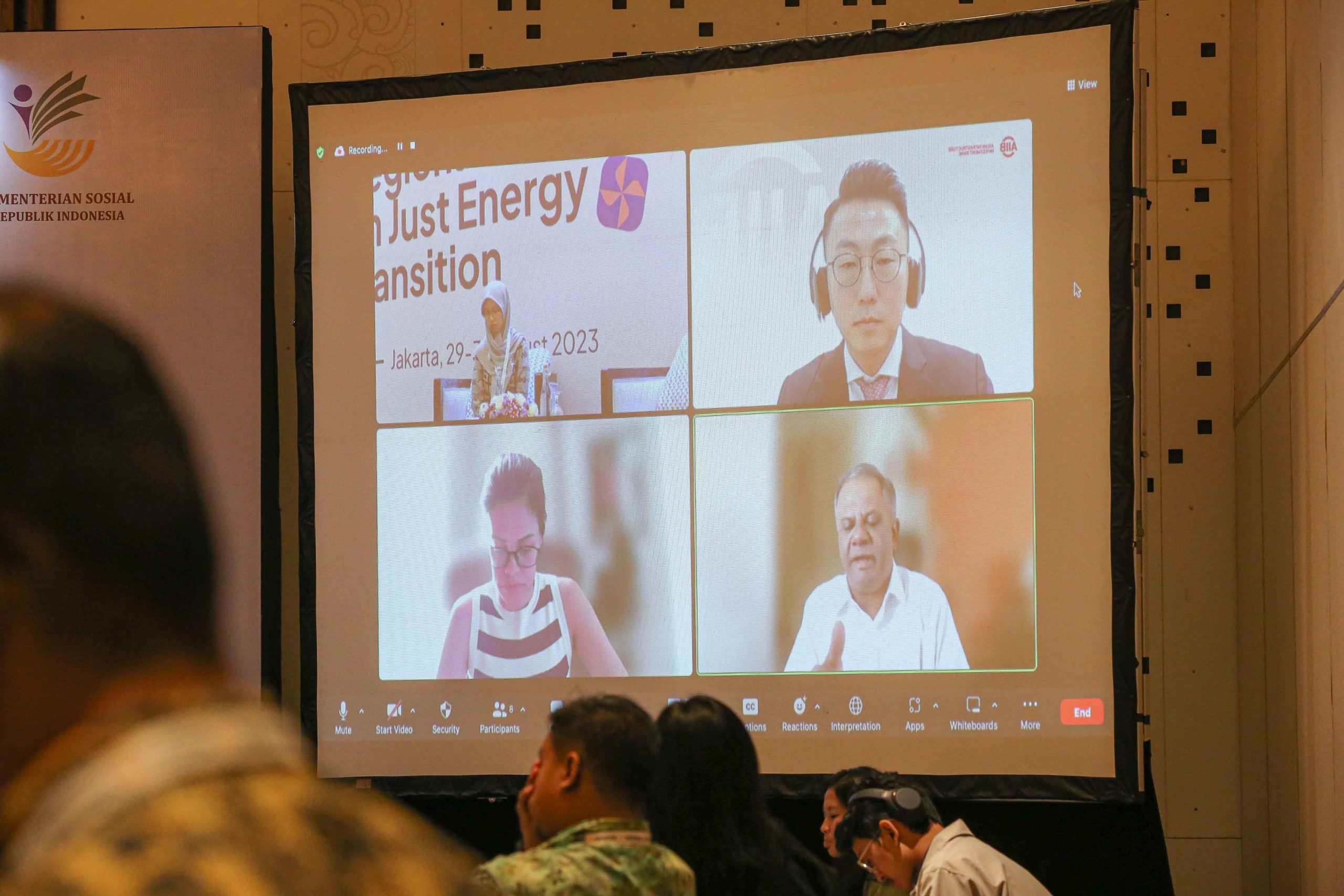Jakarta – The second session of the first day in the series of Regional Meetings of Civil Society Organizations for a Just Energy Transition presented a public dialogue entitled “Climate and Energy Financing in ASEAN,” which presented three speakers who explained the challenges and opportunities in financing the transition to renewable energy in the ASEAN region. Dwi Rahayu moderated the session from The Prakarsa. The speakers included Bernadette Victorio, Lead Project of Fair Finance Asia, Ramnath N. Iyer, Lead Researcher of Climate and Renewable Energy Financing at The Institute for Energy Economics and Financial Analysis (IEEFA), and Jaeho Chung, Senior Investment Officer at the Asian Infrastructure Investment Bank (AIIB).
 Bernadette Victorio began by introducing Fair Finance Asia (FFA), an initiative of Oxfam’s Regional Program, working with more than 90 civil society organizations in ten countries in the ASEAN region. FFA’s mission is to ensure that financial institutions operating in the region uphold social and environmental rights and community welfare.
Bernadette Victorio began by introducing Fair Finance Asia (FFA), an initiative of Oxfam’s Regional Program, working with more than 90 civil society organizations in ten countries in the ASEAN region. FFA’s mission is to ensure that financial institutions operating in the region uphold social and environmental rights and community welfare.
Bernadette highlighted the FFA’s focus on aligning private financial institutions with international norms and standards on social and environmental impacts. They aim to encourage such institutions to support climate and energy transition initiatives in Asia and promote sustainable and responsible finance. FFA’s research studies focus on equitable energy transition, coal finance, and renewable energy finance.
In 2021, FFA released the study “A Future Without Coal,” which revealed that many Asian financial institutions continue to finance coal despite commitments made under the Paris Agreement. Another study, “Financing the Just Transition,” launched in 2022, examined the financial flows of leading international and Asian financial institutions regarding renewable energy financing. Finally, they conducted a case study on the energy transition mechanisms of Asian development banks.
These studies highlight the slow progress in transitioning from fossil fuel finance in Asia and emphasize the need for more substantial social and environmental considerations in the energy transition. Bernadette discussed the key recommendations outlined in their white paper, which align with the imperatives of climate science and ensure equitable treatment of communities affected by the energy transition.
Next, Ramnath N. Iyer, representing the Institute for Energy Economics and Financial Analysis (IEEFA), discussed the current state of climate finance in the ASEAN region. He emphasized the importance of financing the transition to renewable energy to achieve climate goals. Ramnath shared insights from a recent report from Temasek, Bain, and Gen Zero, which revealed that only $5 billion was invested in the green sector in Southeast Asia in 2021, a 7% drop compared to the previous year. Foreign investment in the green industry also decreased by 50% in 2022. Developing countries receive only 15% of the required climate finance, indicating a significant funding gap.
Ramnath discussed the need for innovative financing instruments and greater involvement of multilateral development banks (MDBs) in supporting green projects. He emphasized the importance of shifting funding from fossil fuels to clean energy. Ramnath also highlighted the potential of green bonds, carbon markets, and carbon offset mechanisms in driving investment for clean projects. While recognizing the challenges, Ramnath remained optimistic about the availability of funding to address climate change. He encouraged a shift in focus from traditional sources of financing to support renewable energy initiatives.
At the end of the session, Jaeho Chung, Senior Investment Officer at the Asian Infrastructure Investment Bank (AIIB), provided insights into AIIB’s commitment and financing approach. AIIB is dedicated to building environmentally, socially, and financially responsible, sustainable infrastructure while addressing climate change. The AIIB has outlined five strategic priorities, with green infrastructure as one of the essential focus areas. The bank supports renewable energy projects, including solar, wind, hydro, geothermal, and hydrogen, as well as social infrastructure, regional activities, and technology infrastructure.
Jaeho highlighted the AIIB’s efforts to support private sector projects to provide funding for 50% of private sector projects by 2030. The bank also invests in equity for specific tasks, especially at the seed funding stage. He discussed AIIB’s role in approving projects across the ASEAN region, including hydro, wind, and solar projects, and AIIB’s interest in upcoming projects such as offshore wind, hydro, and geothermal.
The AIIB, in collaboration with other multilateral development banks, is committed to financing the transition to renewable energy and building a sustainable future for the ASEAN region. The discussion at this session emphasized the need for increased climate finance, innovative funding mechanisms, and firm commitments from financial institutions, governments, and international organizations to support the transition to renewable energy in ASEAN.
The Regional Meetings of Civil Society Organizations for a Just Energy Transition attended by more than 70 Civil Society Organizations was held on 29-30 August 2023 in Jakarta. It is a meeting of minds, a synthesis of experiences, and a testament to the commitment of civil society organizations (CSOs), governments, and policymakers to collaboratively chart a course toward a sustainable and equitable future, particularly in the Southeast Asia region.
Author: Raudatul Jannah
Reviewer: Aryanto Nugroho